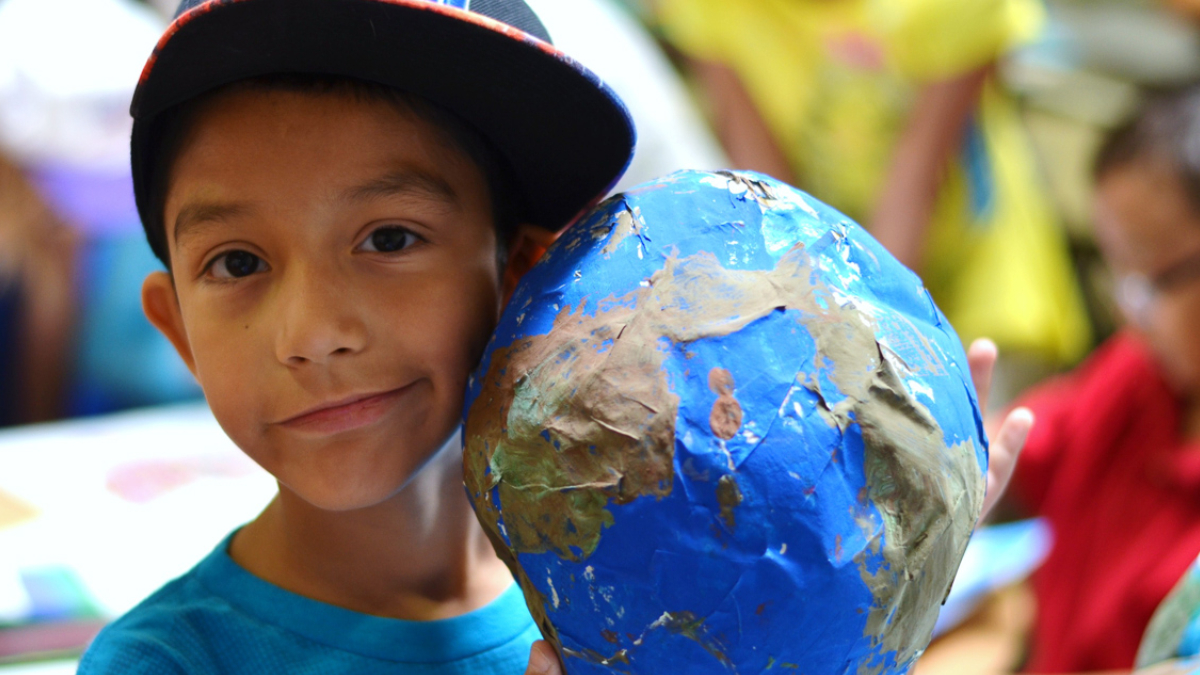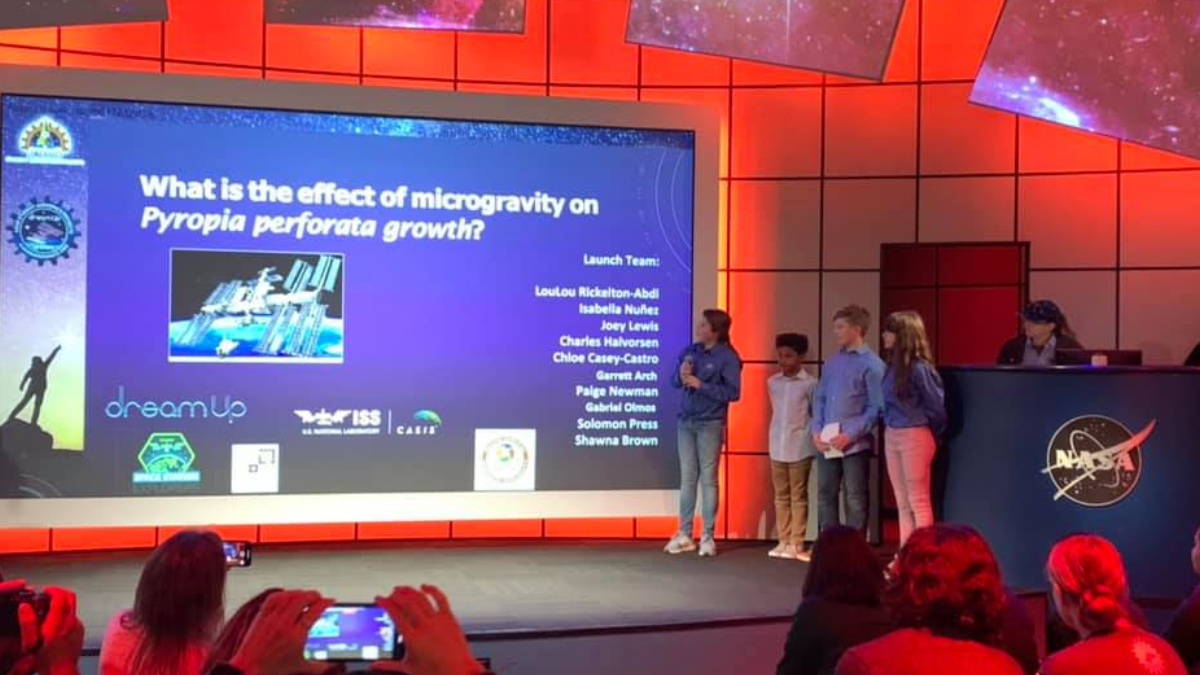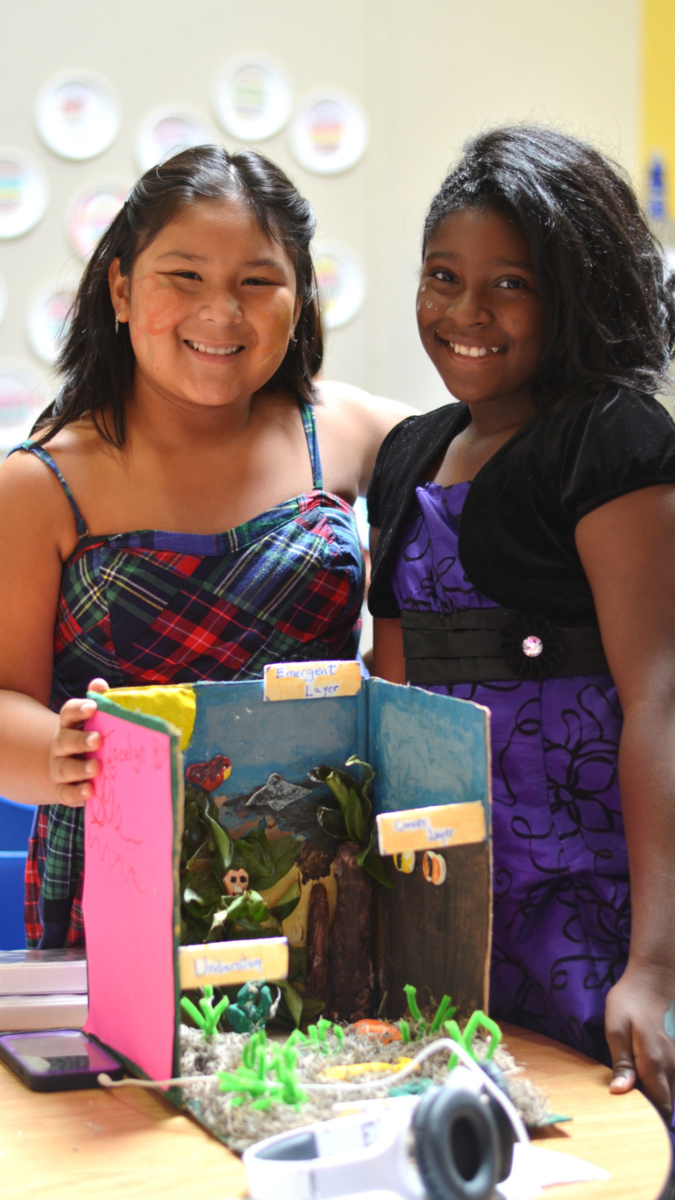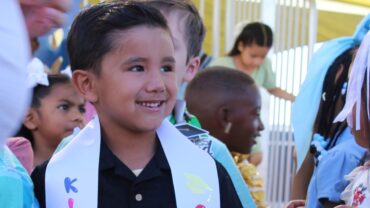Why Presentations of Learning Are Foundational to iLEAD Culture

By Michael Niehoff
Education Content Coordinator, iLEAD Schools
One of the first terms iLEAD newcomers learn is POL. This stands for Presentation of Learning, a foundational element of project-based learning at the network of schools.
The Why
In project-based learning, learners produce work and present their learning to an audience. iLEAD believes this builds essential skills for success in the 21st-century world and economy.
Producing and sharing work connects to important characteristics of project-based learning.
The first characteristic is authentic learning. Presenting a public product makes it more authentic for learners. The deadlines, expectations and outcomes are real.
The second characteristic is receiving critiques and revising to achieve a higher quality of work. Having a public product allows for greater feedback opportunities (from peers, facilitators, professionals, experts, community members and employers).
The third characteristic is a high level of reflection, or metacognition. Having a public product allows more people to experience the learner’s work. This allows for celebration but also builds learners’ skills in articulating and defending their learning.
Beyond these outcomes, learners benefit in the following ways when they work toward presenting public products:
- They take more ownership when they know others will see and assess their work.
- They produce tangible evidence and documentation of their work that can be useful for college and career.
- They learn from their own work and from observing others’ work during all stages of design and presentation.
- They have opportunities to network with peers, professionals, experts, community members, and facilitators.
iLEAD learners create public products and give 65-100 presentations during their K-12 experience, according to Matt Watson, iLEAD California’s Director of Maker Outreach. “We believe learners presenting their work makes them comfortable with the public and a wider audience. They learn to interact and communicate with experts, leaders and many others,” said Watson. “This is really a 21st-century skill set. The feedback they receive makes their work and thinking stronger, while also creating a greater understanding about where others are coming from.”
Watson said iLEAD learners are sharing their work both for live, in-person audiences and online through YouTube, social media, websites, blogs, podcasts and other platforms. “iLEAD learners enter college and career with much less fear of critique, diverse opinions and even their own leadership capacity,” Watson said.
Making It Meaningful
When iLEAD learners present their products, innovations, ideas and learning publicly, this informs the learner that they have something worthwhile to offer to the greater world, according to iLEAD Director of STEAM Initiatives Kathleen Fredette.
“It means the learners have a willingness to stand up and risk all sorts of things in order to share something meaningful to them as a learner,” Fredette said. “This is one of the most influential aspects of what we do here at iLEAD.”
Fredette said leaders and facilitators at iLEAD believe presenting one’s work publicly communicates to the learner that what they’re doing matters. “It tells them their learning has substance and gives them that reason to put in the effort. Ultimately, it’s a reflection of themselves in the world.”
Although some learners may be shy about presenting, they want to share what they created. In this way, the products create an internal motivation for learners to tackle the challenge.
This is foundational to high-level learning at iLEAD, according to Fredette. “When a person takes the time to articulate — first inwardly, while preparing, and then outwardly, while presenting — it’s a way for the individual learner to make meaning of the content. It also invites others into their experience, their expertise and their world.”
 iLEAD learners involved in STEAM initiatives have presented and shared with professionals in STEAM fields at very high levels, including The Smithsonian, The International Space Station Research & Development Conference and NASA’s Ames Research Center.
iLEAD learners involved in STEAM initiatives have presented and shared with professionals in STEAM fields at very high levels, including The Smithsonian, The International Space Station Research & Development Conference and NASA’s Ames Research Center.
“When we make a way for subject matter experts to speak into the body of learning of an individual learner or team of learners, it is a triple-dip,” said Fredette. “The kids are connected to and enlarged by the association with real audience members: experts, professionals, community leaders and others.”
According to iLEAD Lancaster Facilitator Kimberli Lengning, the kindergarten project Something Fishy includes collaborations with local Department of Fish and Wildlife representatives and other community organizations. In the last presentation, learners included family members who were anglers and water conservationists. Kimberli works closely with Rudy Brown, a volunteer for the Department of Fish and Wildlife who is working to partner Trout in the Classroom with the Fillmore Fish Hatchery, Hot Creek’s annual Trout Fest, and Snowcreek’s annual Kids Fishing Derby.
 For another project, called Waves of Change, iLEAD Lancaster kindergarteners collaborate with 8th graders to learn about ocean habitats, animals, and the threats from pollution and climate change. Kindergarteners focus on developing knowledge and vocabulary, integrating ocean science with language arts and quality texts to discuss with their 8th grade “Big Buddies.” The 8th graders focused upon activism and conservation of the ocean. Together, they visited the Cabrillo Marine Aquarium and staged a beach cleanup and demonstration to encourage visitors to protect our local waters. The 8th graders also helped the kindergarteners create various artifacts to display at the Presentation of Learning. On the day of the POL, the 8th grade learning space was transformed into the various ocean “layers” and decorated with artifacts, posters, artwork, and even lights. The stairs down to the 3rd grade classroom became a black-lit “abyss,” where visitors were asked to pick up “litter.” Big Buddies stood with their kindergarten partners to share knowledge and artifacts with visitors.
For another project, called Waves of Change, iLEAD Lancaster kindergarteners collaborate with 8th graders to learn about ocean habitats, animals, and the threats from pollution and climate change. Kindergarteners focus on developing knowledge and vocabulary, integrating ocean science with language arts and quality texts to discuss with their 8th grade “Big Buddies.” The 8th graders focused upon activism and conservation of the ocean. Together, they visited the Cabrillo Marine Aquarium and staged a beach cleanup and demonstration to encourage visitors to protect our local waters. The 8th graders also helped the kindergarteners create various artifacts to display at the Presentation of Learning. On the day of the POL, the 8th grade learning space was transformed into the various ocean “layers” and decorated with artifacts, posters, artwork, and even lights. The stairs down to the 3rd grade classroom became a black-lit “abyss,” where visitors were asked to pick up “litter.” Big Buddies stood with their kindergarten partners to share knowledge and artifacts with visitors.
Future projects for iLEAD Lancaster middle schoolers include building a garden area, various natural play-space activities for younger learners, and an edible garden for the whole school. Materials are paid for by a garden grant, and the outdoor space will facilitate play-space learning and maker projects.
At iLEAD Online, learners often present their public work online. Facilitator Jennifer Turnbull has created an online gallery to showcase her learners’ artwork. She obtained permission forms signed by parents/guardians prior to posting their work. See her iLEAD Online Gallery of learner work here.
It’s Always about the Learners and Learning
iLEAD-SCVi facilitator Dustin Lengning said learners need to know there’s a real outcome or destination for their learning. The Presentation of Learning provides that authentic experience. “They are not presenting to please us, the facilitators, but rather they are doing something that is bigger,” Lengning said. “When our learners reflect back on their experiences, they will discover that the Presentations of Learning opened up doors to opportunities, ideas and careers but, most importantly, themselves.”
RECENT POSTS

How Individualized Learning Empowers Every Learner at iLEAD Lancaster
Every child is unique, wonderfully talented, and inherently valuable. That’s why iLEAD Lancaster is committed to individualized learning, an educational approach that tailors instruction to meet each learner’s distinct needs,… Read more

Summer Office Hours at iLEAD Lancaster
Our office team at iLEAD Lancaster is available to assist you with any questions or needs you may have. Our general summer office hours are Monday through Friday from 8:00… Read more

Free Fun, Resources & More at Olive Palooza: June 27
You’re invited! Olive Support Services presents “Olive Palooza Summer Bash” on Friday, June 27, from 3:00 to 6:00 PM. Join us for an afternoon of free food, clothing, and valuable… Read more


